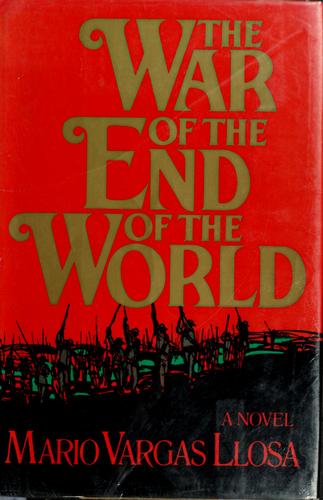Orlion reviewed The War of the End of the World by Mario Vargas Llosa
Review of 'The War of the End of the World' on 'Goodreads'
5 stars
Whew! What a ride. I should qualify that: it is not a 'thriller' sort of ride, though there is some suspense. It is a very literary sort of ride, where the human condition and soul are examined clearly with the rose-tinted glasses shattered on the ground. As a result, this is the most brutal, honest book that I have read to date. It is also, at least according to the brief experience I've had in a Hispanic country, accurate in its portrayal of noble and peasant classes; of ideologies with the type of people that follow and fight for them; of the stubborn persistence of humanity to preserve life even in the most insufferable conditions.
The War of the End of the World is about the Canudos War in Brazil at the end of the 19th century. The Brazilian monarchy had just been overthrown and replaced with the Republic. During this politically unstable time, Bahia ( a northern state of Brazil) has just been decimated by famine, plagues, and roving bands of merciless outlaws. Into this apocalyptic state wanders the enigmatic and charismatic Counselor, a wondering religious teacher around which gather the poor, the prosecuted, and the criminal seeking salvation. When the Republic tries to raise taxes and institute civil marriage in all its districts, the Counselor denounces the Republic as the Anti-Christ and convinces his followers to renounce money, civil marriage, and the metric system as devices of the Dog (Satan) and his Protestant/Freemason followers. They establish themselves in a remote town of Canudos where they establish their own peaceful society, and where the Republic will send armies to squash the rebellion.
Any familiar with these historic events will realize that Llosa's book is not going to be a pretty read. For those who know nothing of these events (the vast majority of English readers, I imagine) I shall list: this book is full of violence, war atrocities, human suffering caused by natural and man-made situations, famine, torture, rape, bombardments, and so forth. If you, as a reader, can not tolerate any or all of this list, it is recommended that you pick another book. I hear that Mario Vargas Llosa's Aunt Julia and the Scriptwriter is a much more lighthearted read. Then again, I feel that for those of us who are more fortunate to not be born in terrible situations such as these, it is our duty to seek out the best written accounts on the subject so that we know of these situations and understand how the world behaves better.
As for the writing style, Llosa uses very interesting techniques. The book is divided into four sections. Each depicts a specific time period of the conflict. Within each section, however, Llosa does not follow a strictly chronological portrayal of events. He jumps around in time depending on the structure of the section (each one has a different structure). I was able to follow events easily, but this could prove difficult to less experienced readers. There is also a lot of characters. A lot of information. A lot of plot, where one line twenty, fifty, four hundred pages before is key to the current passage you are reading. As a result, this book requires your attention and would not make a good 'fluff read' (in case you still think it could be after I've talked about the subject matter).
Overall, it is a very worthwhile read. Nowhere else have I seen a war between ideologies portrayed as well and as humanly as in these pages. Each character, whether they fight for Canudos or for the Republic is portrayed as a separate human being. An entity with good qualities and bad qualities, one that may help some around them and hurt others. In particular, I think of General Moira Cesar nicknamed Throat-slitter. A general who brutally puts down any rebellion against the Republic, often causing prisoners to be killed like an animal about to be butchered (even though he has to know that the peasants believe this will automatically consign their souls to hell). And yet, he does all this because of his love for the Brazilian people. Often times, running across poor, emaciated women and children on his way to Canudos he will order that rations be provided for them. It is made quite clear that he does all that he does and supports the Republic because he feels it is the best way to succor the downtrodden.
The subject matter and the masterful writing makes this book a tough read. But it is a worthwhile read... perhaps one of the best gifts to Western literature.

